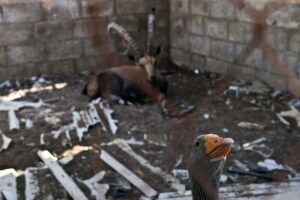Middle East Monitor.com
Zarefah Baroud
 People for the Ethical Treatment of Animals (PETA) praised Israel last week for being the first country to ban the sale of animal furs. Such legislation is worthy of praise, of course, but in the case of Israel any praise, especially regarding its ethics towards animals, is completely misplaced.
People for the Ethical Treatment of Animals (PETA) praised Israel last week for being the first country to ban the sale of animal furs. Such legislation is worthy of praise, of course, but in the case of Israel any praise, especially regarding its ethics towards animals, is completely misplaced.
Throughout the country’s short history, Israel has repeatedly exposed its worrying position on environmental justice with its state-protected environmental terrorism and deliberate military attacks on animals. The military offensive against the Gaza Strip in 2008-2009, for example, killed hundreds of Palestinians, as well as many animals, particularly those sheltered at the Gaza Zoo.
“This camel was pregnant, a missile went into her back,” Gaza zookeeper Emad Jameel Qasim told Gulf News at the time. “Look, look at her face. She was in pain when she died.”
According to Qasim, when Israeli soldiers entered the zoo, they made their way to the lion enclosures and shot the animals at point-blank range. Monkeys nearby tried to flee. Some were shot inside their enclosures, while others attempted to hide in clay pots and adjacent offices, only to be hunted down and killed in the most brutal of ways at the hands of the “world’s most moral army”. Many of the animals that weren’t killed by Israeli bullets starved to death because the people taking care of them were trapped in their own homes due to the Israeli bombardment.
Rather than a condemnation of Israel’s attacks on all living beings in Gaza, less than a month later PETA took it upon itself to come up with a solution to the so-called “Israeli-Palestinian conflict”. The campaign group appealed to the Israeli Defence Ministry to install a “pro-vegetarian mural” on both sides of Israel’s apartheid wall and barriers in the West Bank and Gaza adorned with the phrases “Give Peas a Chance” and “Nonviolence Begins on Your Plate: Go Vegetarian”. PETA has made it perfectly clear through statements such as these that, like the lives of the people of Palestine, the lives of Palestinian animals are not worthy of mention.
Unfortunately, 2008/9 was not the only time that Israel has attacked Gaza Zoo. In 2014, during the occupation state’s so-called “Operation Protective Edge”, Israeli forces bombarded the zoo again, killing more than 80 animals. A number of the zoo’s lions had to be taken elsewhere to recover from the trauma they suffered, a privilege that no Palestinian human beings are afforded.
During that same assault on the Gaza Strip, Palestinian farmers were devastated by the bombing of their agricultural land and livestock. Ali Alommor, a Palestinian farmer in Gaza explained to Middle East Eye that his donkeys were vital for his livelihood and that of his family. However, the Israeli offensive left his donkeys “riddled with bullets” and one looking like it had been run over by a tracked vehicle, such as a tank or armoured bulldozer, as it tried to flee. Another farmer, Sami Abu Hadaeid, had to flee from the bombing, leaving his beloved sheep behind. All 30 of the animals were killed before he could return. They were either shot and decapitated by soldiers or were crushed underneath the rubble of their shelters. Israeli tanks also killed more than 500 cows that supplied many Palestinians with milk, supporting the livelihoods of sixty families. Similarly, in 2017 an Israeli F-16 aircraft fired a missile at a chicken farm in Gaza. The roofs of the enclosures collapsed, killing hundreds of the birds.
OPINION: Critics of conditions in Gaza Zoo expose the value placed on Palestinian lives
Israel’s lack of humanity and concern for Palestinian life has always been extended to include the local environment, livestock, and crops. Whether that be the state-protected illegal settler arson attacks on Palestinian olive groves, toxic waste dumping in the West Bank, or the destruction of Gaza’s water treatment infrastructure leading to the dangerous pollution of the Mediterranean Sea, the Israeli regime has remained consistent in its positions towards Palestine’s people, animals, and wildlife habitats.
At the very least, it is irresponsible for PETA to applaud any action by the Israeli government, considering Israel’s brutal legacy of violence towards Palestine’s environment and the animals it sustains. The activists within the organisation would be better off campaigning for animal rights in the territory occupied and controlled by the colonial state. Anything less diminishes their credibility.

